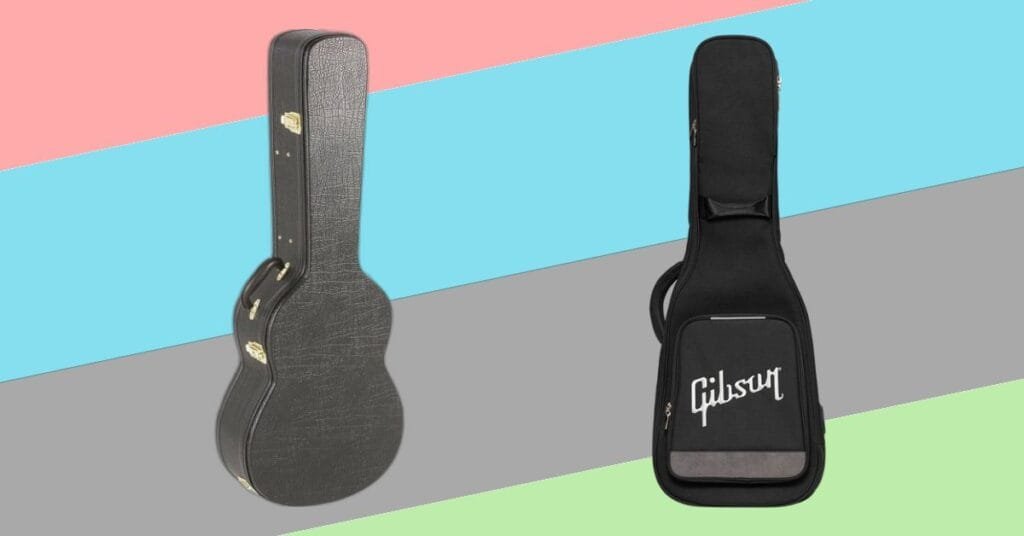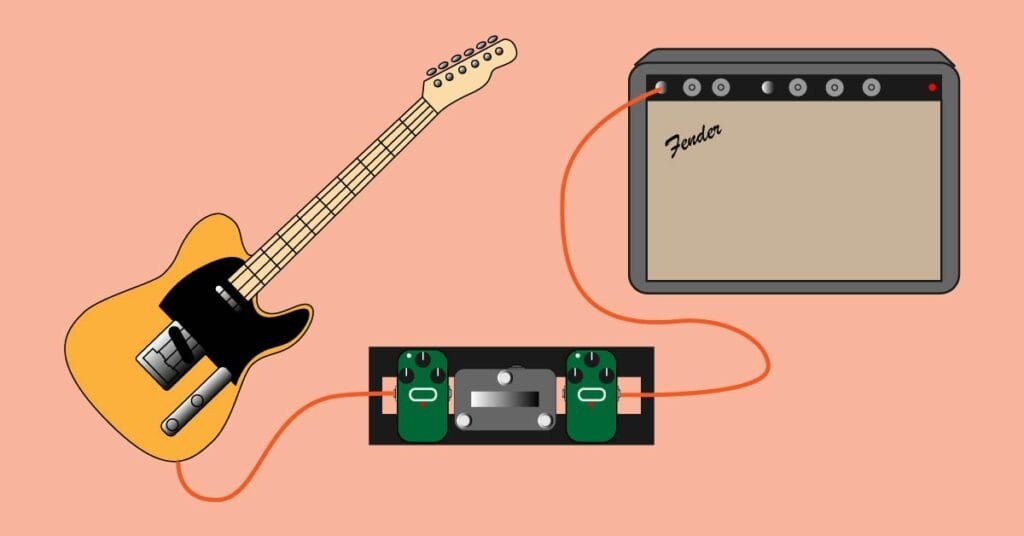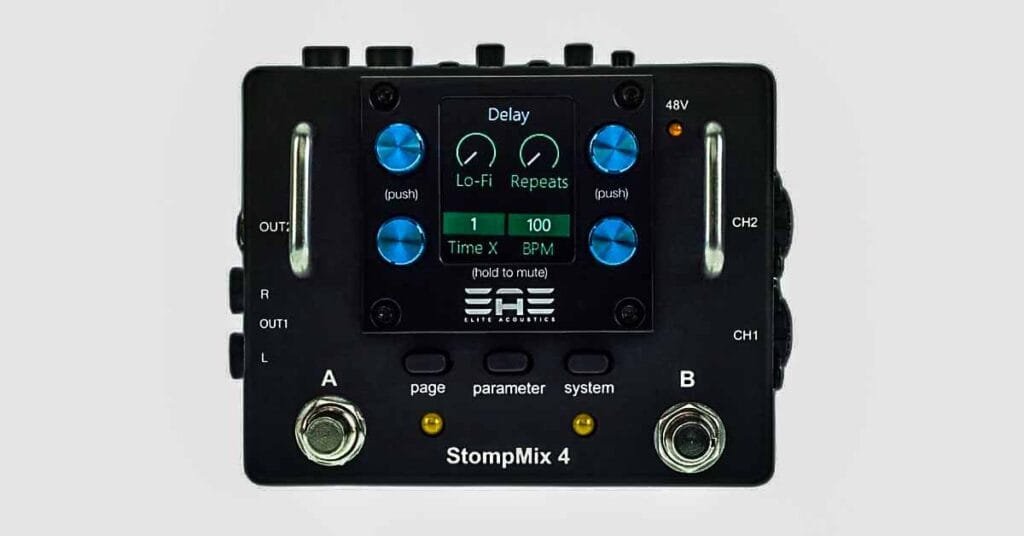Gig Bag vs Hard Case: Which is best for guitars
If you are a musician who is constantly on the move, from venue to venue, day after day, you must ask yourself: What is better for my guitar: a gig bag or a hard case (or hardshell case)? This debate is common among all types of guitarists: gig bag vs hard case. Seriously, you can’t leave the house just holding your guitar in your hand without any protection.
Lugging heavy equipment around is not the easiest thing in the world. Many things can go wrong. You can bump into a wall or the PA while carrying your guitar, it can drop from the stage while unpacking other gear, a rainstorm can start, and the list goes on and on.
Choosing the right protection or your instrument is crucial. It depends on many factors. Understanding the pros and cons of each type of bag or case will help you make the decision that is best for your needs.
This is what this guide is about, providing you with all the information you need so in the end you know which type of protection you need for your guitar: gig bag or hard case.
- The importance of choosing the right gig bag or hard case
- Factors to consider when choosing a gig bag or hard case
- Gig bags: lightweight and convenient
- Hard cases (gig cases)
- The Softshell Case: Best of both worlds
- Top gig bag and hard case brands
- What is the difference between a hard case and a flight case?
- Are gig bags safe?
- Conclusion
The importance of choosing the right gig bag or hard case
Your music gear, including your guitars, are not just tools of your trade, they make you what you are, an artist, so you have to treat them in the best possible way you can. Protection is not the only aspect when choosing the right bag, it must also serve you in an easy functional way.
Not all gigs are the same. If you are traveling to a gig with public transportation or have to walk a long distance to the venue a gig bag is a better solution. But if your whole band travels in one car or van and you need to stack gear on top of each other a hard case works better.
Factors to consider when choosing a gig bag or hard case
For musicians who play concerts almost every day and have to handle all their equipment by themselves, the choice between a gig bag and a hard case will depend on several important factors. You will have to prioritize these factors and make a decision on which type of protection to use based on the most important factors that suit your specific needs.
1. Frequency of travel
If you are always moving from one gig to another and have to carry your instrument over long distances or through crowded areas like pubs, you will be better off with a gig bag. The only downside would be that if you have to stack lots of gear during transport, your instrument should go on top.
2. Storage needs
Depending on where you prefer to keep your guitar accessories, the amount of storage a case or bag offers is what will be the main factor to consider when choosing the right protection for your instrument.
If you prefer to keep most of your accessories with the guitar at all times, then a gig bag is a better solution. But if you have a separate case for all your accessories and want to protect a delicate guitar during transport, a hard case is better.
3. Level of protection
For those who need maximum protection due to the fragility of their instrument, there is no doubt, that a hard case is the only way to go. This factor overrides all others.
4. Price
Generally hard cases are more expensive than gig bags. If you are on a budget, there is no doubt that a gig bag is the right choice. Just be sure to avoid stacking other gear on your gig bag.
5. Durability and construction
Some factors are not only to determine whether you need a gig bag or a hard case. They can also help you with deciding between different models of the same type of protection. Let me explain:
There are hard cases made of ABS plastic, reinforced wood, or cheaper materials. The most important thing to consider is do you need a hard case that will last for a lifetime or just to protect your guitar for the time being. Also, gig bags are made with different padding thicknesses and different quality zippers. Don’t forget to take a look at the stitching. The quality of the stitching can make a big difference in terms of longevity. So, if you’ve decided to buy a gig bag, consider the factors mentioned in this article to help you choose the right gig bag for you.
6. Portability and weight
If you must use a hard case, but you have to carry your guitar a lot or have back problems, then the weight of the hard case is the most important factor to consider. A good quality hard case that is also very lightweight will cost you an extra amount of money, but the benefits are much bigger in the end. If you get less tired before the gig, your gig will always be a success.
There is always a solution for someone who needs a heavy hard case but doesn’t or can’t carry it. If you are considering buying a flight case which is the big brother of hard cases you can get one with wheels or simply use a foldable musician’s cart.
7. Instrument-specific fit
Always consider the internal dimensions of a gig bag or hard case before buying it. Some instruments are differently shaped and have various thicknesses so be careful with that.
Gig bags: lightweight and convenient
Gig bags (also called soft cases) are made of lightweight materials like nylon, polyester, or leather that are durable for most normal situations. Their interior is padded so your instrument is cushioned when placed inside. A great plus is that most gig bags feature a variety of pockets for storing guitar accessories. Compared to hard cases, gig bags are more portable and easier to maneuver through tight spaces and are easier to carry over long distances thanks to backstraps and several handles.
Pros:
1. Portability
Gig bags are lightweight which makes them easier to carry. This is an ideal option for musicians who need to carry their instruments frequently and for long distances. One big advantage gig bags have over hard cases is that they come with backpack-style straps so you can carry your amp in one and your pedalboard in the other hand.
2. Cost-effective
In general, gig bags are cheaper than hard cases, but still, there are many top-quality gig bag manufacturers that produce very expensive products.
3. Storage
All gig bags come with multiple pockets for storing all your accessories like cables, strings, extra straps, capo, sheet music, tablet, and so on.
4. Flexibility
Gig bags have a smaller dimension than hard cases and can be stored in tight spaces. Also, you can easily get your guitar out of a gig bag while it’s standing so you don’t need to put it on the floor opposite to a hard case.
Cons:
1. Limited protection
Gig bags have padding, but it does not provide the same protection that hard cases offer. So, if your guitar placed in a gig bag would fall from a certain height it could easily get damaged.
2. Durability
Gig bags wear off over time. Their fabric can get torn, zippers can break, and the padding can fall out due to wear from the inside.
3. Weather vulnerability
Gig bags can protect your instrument from rain for a short period of time, but for longer periods of rain, moisture will find its way inside your gig bag.
Hard cases (gig cases)
Hard cases, also called gig cases, are made with materials like wood, metal, or ABS plastic. They are designed to provide maximum protection from impacts and non-friendly weather conditions that could harm your instrument. They are much heavier and less portable than gig bags but for some musicians, they are a necessity.
Pros:
1. Top protection
Hard cases are designed to provide the highest level of protection for your instrument. They can survive heavy bumps and drops so your instrument remains untacked.
2. Weather resistance
Hard cases are mostly water-resistant which will protect your instrument from rain, humidity, and big temperature fluctuations.
3. Longevity
The construction of hard cases is made to last for a long time, much longer than a gig bag.
4. Stackability
Hard cases have relatively flat and hard surfaces which are ideal for stacking with other gear. If you transport a lot of gear at once and are limited with space you will need a hard case instead of a gig bag.
Cons:
1. Weight
Hardcases are much heavier than gig bags, which can be a limitation when having to carry your guitar for long distances.
2. Limitation of storage space
Unlike gig bags, hard cases usually do not have much additional storage space. They usually only have a small compartment under the neck for guitar-shaped hard cases and in one upper corner for rectangular shapes.
3. Cost
Guitar hard cases usually come with a higher price tag than gig bags, but there still are cheap ones available. Some have bad quality, some are OK. Before buying anything that is cheap, do your research, and see what others have to say about them on Quora, Reddit, or Gearspace.
4. Bulkier
Since hard cases are much heavier and bulkier than gig bags, they can be hard to carry. This is a factor to consider if you carry all the things yourself for long distances.
The Softshell Case: Best of both worlds
The softshell guitar case is a hybrid of the gig bag and the hard case. It has the firmness of a hard case with a soft exterior. This is a good choice for someone who doesn’t stack their guitar with other gear but still wants some additional protection. I think it’s a winner for someone who has a delicate car interior.
Main features:
- Material: Typically made of a thick and durable lightweight fabric with rigid properties
- Interior: Soft, almost the same as in a hard case
- Padding: More padding compared to gig bags
- Weight: Lighter than a hard case but heavier than a gig bag.
- Protection: Somewhere between a gig bag and a hard case, probably on the hard case side.
- Storage: Has more storage than a regular hard case
- Portability: Comes with carrying handles and often shoulder straps for easier transport.
Top gig bag and hard case brands
Gig bag brands
- Fender: The most popular guitar brand also makes great and affordable gig bags
- Gator cases: Affordable gig bags for various instruments
- Rockcase: Durable and modern gig bags
- Mono: high-end gig bags
Have a look at some popular gig bags:



Hard case brands
- Fender: The most popular hard case manufacturer
- SKB: Top-quality, made in the USA, has models for almost every electric guitar shape
- Gretsch: That great Gretsch sound also makes top-quality hard case
- Donner: Most popular budget hard cases
- Gator: Every type of hard case you could need


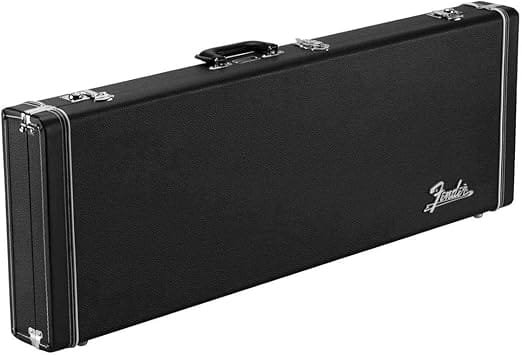
What is the difference between a hard case and a flight case?
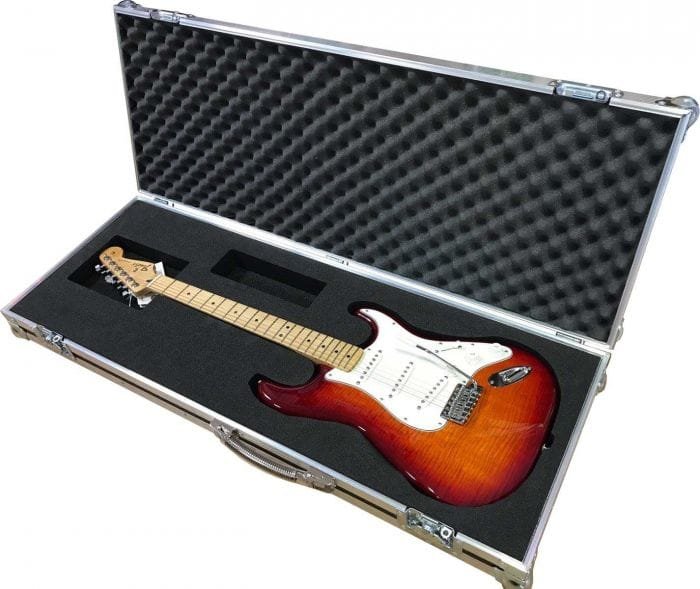
So far we’ve been concentrating on gig bag vs hard case. But what about hard case vs flight case? A hard case is lighter and a bit smaller than a flight case. Flight cases provide the best possible protection for your instrument but they are for musicians who usually have roadies who do all the heavy work and travel by plane. Flight cases are built the same way for guitars as for any other piece of equipment such as a public address system.
Are gig bags safe?
As long as you don’t have to carry them on a plane, or throw in a car full of equipment that isn’t packed securely, you are good with using a gig bag. Even a hollow-body guitar can be placed in a gig bag, as long as it has the thickest and toughest padding you can find. Remember, never stack anything heavy on a gig bag.
Conclusion
The choice between a gig bag and a hard case depends on the specific needs of the musicians. If you need a lightweight, easy-to-carry in-hand or on-back solution, a gig bag is the right choice. But if you travel long distances and stack gear in your vehicle, and need maximum protection, a hard case should be your choice.
The right gig bag or hard case can enhance your overall experience as a musician. Which gig bag or which hard case or flight case you buy will depend on many factors. If you need heavy protection for your guitar, whether you use a bag or case, there are always features that can help you. Padded straps, wheels, multiple handles, and lightweight but tough materials are your friends.
Many guitarists use a gigbag for short trips to gigs or rehearsals and a hard case for longer rides for the same guitar. This way you can have several guitars at home with hard cases and just one extra gig bag for when you travel alone. One hard case or gig bag fits many types of guitars so you don’t need to have both types for each guitar.
Protect your guitar or bass, get the best protection for your instrument.
